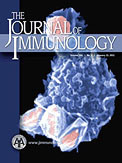Vlková M, Fronková E, Kanderová V, Janda A, Ruzicková S, Litzman J, Sedivá A, Kalina T. J Immunol. 2010 Dec 1;185(11):6431–8. Epub 2010 Nov 1. IF: 5.646

Abstract:
Increased proportions of naive B cell subset and B cells defined as CD27(neg)CD21(neg)CD38(neg) are frequently found in patients with common variable immunodeficiency (CVID) syndrome. Current methods of polychromatic flow cytometry and PCR-based detection of κ deletion excision circles allow for fine definitions and replication history mapping of infrequent B cell subsets. We have analyzed B cells from 48 patients with CVID and 49 healthy controls to examine phenotype, frequency, and proliferation history of naive B cell subsets. Consistent with previous studies, we have described two groups of patients with normal (CVID-21norm) or increased (CVID-21lo) proportions of CD27(neg)CD21(neg)CD38(neg) B cells. Upon further analyses, we found two discrete subpopulations of this subset based on the expression of CD24. The B cell subsets showed a markedly increased proliferation in CVID-21lo patients as compared with healthy controls, suggesting developmental arrest rather than increased bone marrow output. Furthermore, when we analyzed CD21(pos) naive B cells, we found two different subpopulations based on IgM and CD24 expression. They correspond to follicular (FO) I and FO II cells previously described in mice. FO I subset is significantly underrepresented in CVID-21lo patients. A comparison of the replication history of naive B cell subsets in CVID patients and healthy controls implies refined naive B cell developmental scheme, in which human transitional B cells develop into FO II and FO I. We propose that the CD27(neg)CD21(neg)CD38(neg) B cells increased in some of the CVID patients originate from the two FO subsets after loss of CD21 expression.
-mk-
